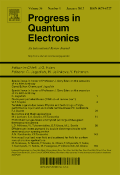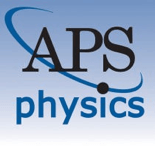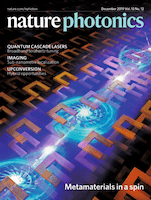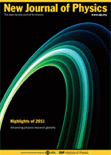
Advanced Quantum Technologies
Scope & Guideline
Advancing Knowledge in Quantum Disciplines
Introduction
Aims and Scopes
- Quantum Information Processing:
Research in this area covers the theoretical and experimental aspects of quantum computing, quantum algorithms, and quantum communication protocols, emphasizing advancements in quantum key distribution, quantum error correction, and quantum cryptography. - Quantum Sensing and Metrology:
This scope includes studies on the development of quantum sensors and measurement techniques that leverage quantum phenomena to achieve unprecedented sensitivity and precision in various applications, including magnetic field sensing and temperature measurements. - Quantum Materials and Devices:
Investigations into novel quantum materials, such as topological insulators, superconductors, and quantum dots, as well as their integration into devices for quantum technology applications. - Quantum Optics and Photonics:
This area focuses on the manipulation and control of light at the quantum level, including studies on single-photon sources, entangled photon generation, and applications in quantum imaging and communications. - Quantum Machine Learning and AI:
Research exploring the intersection of quantum mechanics and machine learning, including the use of quantum algorithms for data processing, classification, and optimization tasks. - Quantum Dynamics and Control:
Studies investigating the dynamics of quantum systems, including control techniques for quantum states and the effects of decoherence and noise in quantum systems.
Trending and Emerging
- Integration of Quantum Technologies with Machine Learning:
Recent publications increasingly highlight the application of machine learning techniques to enhance quantum algorithms, optimize quantum circuits, and improve quantum state discrimination, reflecting a growing trend towards interdisciplinary research. - Quantum Technologies for Communication and Networking:
Emerging works focus on the development of quantum communication networks, including advancements in quantum repeaters and satellite-based quantum key distribution, signaling a shift towards practical implementations of quantum technologies in secure communications. - Hybrid Quantum Systems:
Research on hybrid systems that combine different quantum technologies, such as integrating superconducting qubits with photonic systems, is gaining traction as scientists explore novel approaches to enhance quantum information processing capabilities. - Quantum Simulation of Complex Systems:
There is a growing interest in using quantum simulators to study complex quantum systems, including materials and biological systems, which could lead to breakthroughs in understanding and manipulating quantum phenomena. - Quantum Technologies in Sensing and Imaging:
Emerging applications of quantum technologies in precision sensing and imaging are increasingly featured, with research focusing on the development of advanced quantum sensors and imaging techniques that exploit quantum correlations.
Declining or Waning
- Classical Simulations of Quantum Systems:
Research focused on classical simulations of quantum phenomena has seen a decline as the field shifts towards the development of quantum computers capable of solving problems that are intractable for classical systems. - Basic Theoretical Models Without Experimental Validation:
There has been a noticeable decrease in purely theoretical works that do not include experimental validation or practical applications, as the journal increasingly prioritizes studies with tangible experimental outcomes. - Quantum Cryptography Protocols with Limited Practicality:
While quantum cryptography remains a core topic, there is a waning interest in protocols that have limited real-world applicability or that do not leverage recent advancements in quantum technology.
Similar Journals

OPTICAL AND QUANTUM ELECTRONICS
Pioneering Research in Atomic and Molecular FrontiersOPTICAL AND QUANTUM ELECTRONICS, published by SPRINGER, is a premier journal dedicated to advancing the fields of atomic and molecular physics, optics, and electronic engineering. With an ISSN of 0306-8919 and an E-ISSN of 1572-817X, this journal has established itself as a vital resource for researchers, professionals, and students alike, contributing to the discourse from its inception in 1969 to its continued publications through 2024. It holds impressive rankings in Scopus, placing within the top percentiles for its categories, specifically in the 64th for Electrical and Electronic Engineering and 63rd for Atomic and Molecular Physics. Though it does not currently offer open access options, the journal's robust impact factor reflects its importance within its field, making it an essential reference point for cutting-edge research and developments in materials science and optics. Through its rigorous peer-review process, OPTICAL AND QUANTUM ELECTRONICS remains committed to publishing high-quality, influential studies that push the boundaries of innovation and understanding in these dynamic areas of science.

PRX Quantum
Bridging disciplines through quantum exploration.PRX Quantum is a premier open-access journal published by the American Physical Society, dedicated to advancing the field of quantum studies. Launched in 2020, this journal serves as a vital platform for the dissemination of high-quality research across a diverse range of interconnected disciplines, including applied mathematics, computer science, and electronic engineering, as evidenced by its impressive rankings in the 2023 Scopus categories. With a remarkable impact factor and holding a top quartile position in multiple areas, PRX Quantum is not only pivotal for researchers engaged in quantum physics and related areas but also for professionals and students seeking to stay at the forefront of quantum technology and material science. Additionally, as an open-access journal, it champions the free distribution of knowledge, allowing for wider accessibility and engagement within the global research community. With a commitment to nurturing innovation and interdisciplinary collaboration, PRX Quantum is an indispensable resource for anyone interested in the evolving landscape of quantum science.

PROGRESS IN QUANTUM ELECTRONICS
Advancing Knowledge in Quantum TechnologiesPROGRESS IN QUANTUM ELECTRONICS, published by PERGAMON-ELSEVIER SCIENCE LTD, is a premier international journal that serves as a critical forum for the dissemination of high-quality research in the fields of atomic and molecular physics, electrical engineering, and materials science. With its esteemed Q1 category ranking in several disciplines, including Atomic and Molecular Physics, Electrical and Electronic Engineering, and Electronic, Optical and Magnetic Materials, this journal commands a high impact factor and is recognized for its rigorous peer-review process. Established in 1969 and evolving through various phases, the journal currently compiles cutting-edge research that drives advancements in quantum technologies. Researchers, professionals, and students alike are invited to explore a wealth of knowledge and stay updated on pioneering developments in quantum electronics, enhancing their understanding and contributing to the progression of this dynamic field.

Optica
Unleashing potential through open-access research.Optica is a premier open-access journal published by the Optica Publishing Group, designed to disseminate high-quality research across the fields of Atomic and Molecular Physics and Optics. Since its inception in 2014, it has established itself as a vital resource for the scientific community, as evidenced by its impressive Q1 rankings in both relevant categories in 2023 and its notable positions in the Scopus rankings—#9 in Atomic and Molecular Physics and #13 in Materials Science. Featuring cutting-edge research from leading experts, Optica aims to foster innovation and collaboration by providing unrestricted access to groundbreaking discoveries and advancements. Researchers, professionals, and students alike will find invaluable insights and trends that drive the ever-evolving scope of optical science and materials technology. With its commitment to open access, Optica ensures that knowledge is accessible, empowering the global community of scientists and researchers to embark on new explorations.

Optoelectronics Letters
Exploring the Intersection of Light and ElectronicsOptoelectronics Letters, published by Tianjin University of Technology, is an esteemed platform for the dissemination of innovative research within the fields of atomic and molecular physics, optics, condensed matter physics, and electrical engineering. With its inaugural publication in 2007 and a convergence period extending to 2024, this journal aims to foster scholarly communication and collaboration among researchers and professionals. Although currently lacking an impact factor, it serves a vital niche in the rapidly evolving field of optoelectronics, evidenced by its categorization in the fourth quartile for various physics disciplines and the third quartile in electrical and electronic engineering. Given its ranking dynamics in Scopus, it is an emerging choice for authors seeking to convey their findings on electronic, optical, and magnetic materials. Researchers, students, and industry professionals alike can benefit from its open access options, encouraging a broad dissemination of cutting-edge knowledge that is essential in the advancement of technology and materials science.

PHYSICAL REVIEW A
Exploring the Frontiers of Atomic and Molecular PhysicsPHYSICAL REVIEW A, published by the American Physical Society, is a leading journal in the field of Atomic and Molecular Physics and Optics, boasting a Q1 category ranking in its area for 2023. With an ISSN of 2469-9926 and an E-ISSN of 2469-9934, this journal plays a pivotal role in disseminating high-quality research findings, theories, and methodologies that shape current understanding and advancements in the discipline. Although not an open-access journal, it remains highly accessible to professionals and academia through institutional subscriptions. The journal's impactful contributions are evident from its Scopus rank of #70 out of 224 in the field, placing it in the 68th percentile for scholarly impact. As a hub of innovative research and a vital resource for both students and seasoned researchers alike, PHYSICAL REVIEW A remains essential for those seeking to stay abreast of breakthroughs in atomic and molecular studies, as well as optics and photonics.

QUANTUM INFORMATION & COMPUTATION
Pioneering Research in Quantum Theory and ComputationQUANTUM INFORMATION & COMPUTATION is a leading academic journal dedicated to the rapidly evolving fields of quantum information theory and quantum computing. Published by RINTON PRESS, INC, this journal serves as a pivotal platform for disseminating groundbreaking research, advancements, and theoretical insights in various domains including computational theory, mathematical physics, and high-energy physics. With its ISSN 1533-7146, the journal has established a solid reputation since its inception in 2001 and continues to engage researchers up to 2024. Despite its current standing in Q4 and Q3 quartiles across various categories, QUANTUM INFORMATION & COMPUTATION provides valuable contributions by fostering discussions on interdisciplinary applications and theories that challenge conventional paradigms. While the journal does not offer open access, it still supports a wide range of research topics, providing a vital resource for academics, professionals, and students keen on exploring the complex interplay between quantum mechanics and computation. By focusing on innovative techniques and theoretical developments, this journal is essential for anyone aiming to be at the forefront of the quantum revolution.

Nature Photonics
Illuminating the Future of Photonics ResearchNature Photonics, published by NATURE PORTFOLIO, stands as a leading journal in the realm of photonics, specializing in the convergence of atomic and molecular physics and optics, as well as electronic, optical, and magnetic materials. Established in 2007 and continuing through 2024, this esteemed journal boasts an impressive 2023 ranking of Q1 in both its primary categories, highlighting its importance and influence within the scientific community. With a Scopus rank of #3 in both materials science and physics categories, and a remarkable 99th percentile ranking, Nature Photonics serves as a vital platform for disseminating pioneering research and innovative discoveries that drive the field forward. Although it does not currently offer open access options, the journal remains accessible to a broad audience interested in the latest advancements in photonics, including researchers, professionals, and students eager to explore cutting-edge developments. By fostering a community of collaboration and knowledge exchange, Nature Photonics continually shapes the future of photonics research.

Science China-Physics Mechanics & Astronomy
Advancing Knowledge in Physics and AstronomyScience China-Physics Mechanics & Astronomy, published by SCIENCE PRESS, stands as a prestigious journal within the Physics and Astronomy domain, particularly recognized for its contributions to the understanding of fundamental and applied physics. With an exhilarating Q1 ranking in the 2023 category and earning a remarkable scopus rank of #21 out of 243, the journal demonstrates its significant impact, being positioned in the 91st percentile of its field. Operating under an Open Access model, it facilitates the broad dissemination of high-quality research, ensuring accessibility for researchers, professionals, and students worldwide. Its scope covers a variety of essential topics in physics and astronomy, promoting a comprehensive understanding of the latest advancements from 2010 through 2024. The journal is a vital resource for anyone aiming to stay at the forefront of research in these dynamic fields, with its prominent address located in Beijing, China, symbolizing its global influence.

NEW JOURNAL OF PHYSICS
Unveiling the universe, one discovery at a time.NEW JOURNAL OF PHYSICS, published by IOP Publishing Ltd, is a prestigious open-access journal that has been at the forefront of the physics community since its inception in 1998. With an impact factor that places it in the Q1 category of Physics and Astronomy (miscellaneous) and a commendable ranking of #49 out of 243 in the general physics and astronomy category according to Scopus, this journal is recognized for its significant contribution to advancing research in the field. The journal caters to a broad scope of topics, providing a platform for the dissemination of cutting-edge research findings and innovative theoretical explorations. Operating from the United Kingdom, it offers a truly international perspective, making its contents accessible and impactful to a global audience. With robust open-access options, the NEW JOURNAL OF PHYSICS ensures that research findings are freely available, promoting collaboration and knowledge sharing among researchers, professionals, and students alike. This commitment to accessibility, combined with its high-quality content, makes it an essential resource for anyone engaged in the physics community.